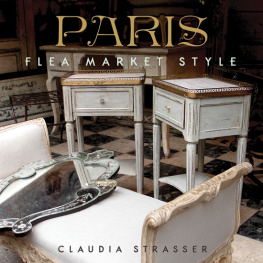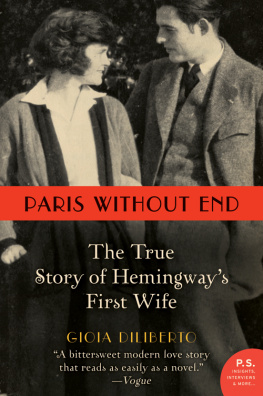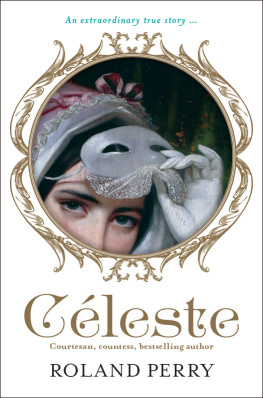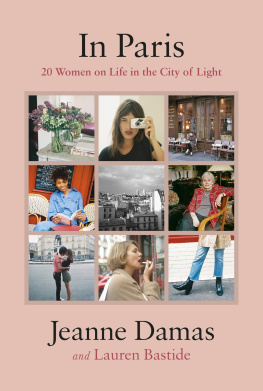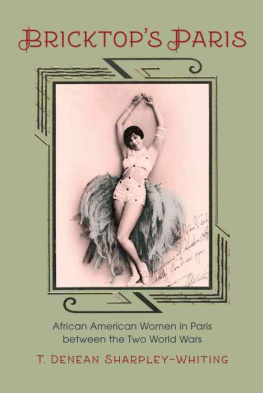Toby Barlow
BABAYAGA
A Novel
Dedicated to Richard Peabody & Rob Stothart, both poets & teachers & good, honest men
Man hunts and fights. Woman contrives and dreams; she is the mother of fancy, of the gods. She possesses glimpses of the second sight; and has wings to soar into the infinitude of longing and imagination. The better to count the seasons, she scans the skies. But earth has her heart as well.
MICHELET
Women must tell men always that they are the strong ones. They are the big, the strong, the wonderful. In truth, women are the strong ones. It is just my opinion, I am not a professor.
COCO CHANEL


There are facts and there are lies. There are true lovers with bad alibis. The world is a busy hive, filled with stories that have been retold over and again ever since our tongues learned to talk and our ears first opened. We hear all this, yet we are still lost, barely making out our path in the pale, inconstant light. As the ancient man said, we know nothing. But I can tell you this much is true, this happened. I know, because my elder sister wrote of it to me in a letter sent late last autumn, of how, behind the high walls of a fading castle, tucked in a valley not far from the northern border of France, a woman in her later years brought out an old guitar and, strumming it gently to find the tune, announced to the night, I will sing you a song now about when the babayagas fled to Paris
When I was living in Paris, we had an expression, a very American one, which in a way explains it better than anything else. We used to say, Lets take the lead. That meant going off the deep end, diving into the unconscious, just obeying your instincts, following your impulses, of the heart, or the guts, or whatever you want to call it.
HENRY MILLER,
The Paris ReviewTime was bothering Zoya. She lay on the broad bed amid the crumpled silk sheets, listening to Leon scrub and gargle in the bath. There was almost a cartoon melody being composed in the various noises of his evening toilette. He always fastidiously washed and perfumed himself after they made love, immersing himself in soaps, talc, and a cloud of eau de Lisbonne before he returned home to face his wife. Even on nights such as this, when his Claudette was out of town, he performed the ritual out of habit. Usually Zoya did not mind, but tonight the music made her sad.
Coming out of the bathroom with the steam billowing out around him, he looked like some gray ball of boiling fat spit out from a cauldron. What is wrong, ma chrie? he asked.
She remembered the day he had first found her while strolling through the Jardin des Plantes. When had they met? Was it the spring in 45? Not long after the war had ended, when the Paris streets and nightclubs thronged thick with a mix of wide-eyed American and British soldiers fresh off the train from Calais and sniffing about for fun. She had her pick of any one of the swarm, but she found Leon instead, a stocky middle-aged Parisian of square chin and broad shoulders, far from the slouching fat man he had grown into. So much time had passed as she had watched his profile slip and slide steadily down from stout to rotund to fat, eyes growing cloudy, his bright blue irises dimming to a mottled gray, folding bloodshot beneath the heavy lids and puffy circles of wine-swollen flesh. When he was drunk on brandy, he loved to recount how he had once been a formidable athlete, back in his Catholic school days, but she had a hard time convincing herself of that, looking at him now, for he was simply a doughy old man, while she still looked as fresh as she had the day they first met.
I have a small headache, I need fresh air, she said. Why dont you get dressed and we can have a stroll before you go home?
At this hour? Ha! Have I not exhausted you yet? As he toweled off his back, his vast white belly shook. It was almost too silly to watch.
I slept all day, she said. It is a pleasant night and it will do you good to move those bones of yours. She looked around the roomthe tall dresser, the modest crystal chandelier, a framed dark oil of the dead red fox surrounded with ripe autumn apples that hung above her small desk. Though the artwork seemed merely decorative now, she could remember when still-life paintings of heaping bowls of blushed fruit kept verdant hopes budding during the bleak seasons of cold cabbage and cellar potatoes. Look here, the pictures said, and do not lose faith. Pear, peach, apple, and plum, all will blossom again.
Beside the painting, three silver clocks sat on the mantel. Leon had told her they were from the collection of Princess Mathilde. Zoya did not know if she believed him, her pompous and proud Leon was certainly prone to exaggeration. But she did enjoy the comfort each of these intricately designed timepieces provided. One clock counted the months along with the hours, another tracked the phases of the moon, the third was astrological, showing the zodiac arcing above the hours as the year progressed. Through the day and night the clocks light, gentle chimes provided a charming accent to the quiet apartment, grounding her in her well-appointed surroundings and bestowing a small delight with their delicate tones. Over the years, Leon had periodically presented these precious gifts to her, along with perfumes, pendants, pearls, fox stoles, and soft leather gloves, repaying her undemanding patience, her indulgent good humor, and her generous physical attentions with luxuries that had, over time, soothed and almost succeeded in letting her forget what was coming. But it was never too far from her mind. She knew she would miss all these delicate and beautiful treasures; she would not be able to take much with her. Like the summer birds now instinctively leaving the branches of the Paris trees for their warm Mediterranean refuges, it was time for her to go. The river of time was loud in her ears now, foaming and surging, washing the whole room away.
That first day, so long past, she had been sitting with Elga, the squat old woman napping with her eyes half closed, sinking down into the bench like a fat, cooling scone on a bakers shelf, while Zoya relaxed with a novel. She tried to remember who it was, a Russian no doubt, Gogol or Turgenev. At that point they had not been in Paris long. She did recall very clearly how the shadow crossed her page, and how she looked up to find a grinning Leon standing there in the evening light. Zoya had offered a polite smile.
She shook the memory off and rose from the bed. It is our last night together before your Claudette returns from the country. I want to walk with you. Dont worry, nobody will see us. Leon was always easy to read, simple to lead. Come, she said, tossing him his shirt from the bed. We can go down by the river. You can tell me about your week while we walk, and then I will tell you an old country tale as we return.
He smiled. Her Leon, like every man she had ever known, liked her stories, the old Russian sagas she would often spin to make the men grin or laugh or lull them to sleep. Many of her yarns were made up, while others were true, some were bawdy, others bloody, but she couched them all in the velvet warmth of folk fables. Each one held a kernel of a lesson, there to be found by the attentive and curious, but although Leon savored the adventures of lost children and dancing, bell-chiming bears, of damp, hungry soldiers finding false comfort in lone cottages, and of brides with serpents curled up in their hair, Leon never bothered to grasp any of the morals. Few of her men ever had. She had come to believe that fables and tales and even epics from history taught very little, they held not enough sting for their lessons to stick.




